Rob Nunn's Blog: Interesting Though Elementary, page 3
August 11, 2024
Interesting Interview: Jessica Schilling & Eric Scace
Here's another first for the Interesting Interview series: a 2 for 1 special! Jessica Schilling and Eric Scace are a couple who are not only great folks, but great Sherlockians to boot. Jessica Schilling won the Baker Street Journal's Morley-Montgomery Award in 2020 and was invested into the BSI this January. Eric Scace won the Morley-Montgomery Award this year and was tapped to give a fascinating talk at the Minnesota conference last month.
Both participants are super cool, and I was lucky to get to spend time talking to Eric in Minneapolis. Seeing Eric and Jessica together during that conference was like seeing a personification of yin and yang; they have such standout personalities but if you see them together it's clear what a strong unit they are. You'll see that Jessica and Eric bring a great energy to Sherlockiana, and the future looks bright with both of them in it!
How do you define the word “Sherlockian”?
Jessica: I’d say that anyone who’s fascinated enough by the Canon — or by the scholarship or community that surrounds it — has earned the moniker just on that fascination alone! One of the best things about this little alternate reality of ours is that it’s something people can approach from so many different angles. Literary scholar? Write a paper. Wannabe consulting detective yourself? Go deduce the dates or locations of some of the cases! Film buff? Dive into all the different ways Holmes and Watson have been depicted over the years. There really is something for everyone here.
Eric: What she said! Other observers have pointed out that most collectors need a focus; few can be the vacuum-it-all omnivore that John Bennett Shaw was. Most Sherlockians have focii for their attentions (physical or otherwise) — and for the types of events (if any) in which they prefer to participate. A attribute of the world of Sherlockians is acceptance — which, unfortunately, appears all too scarce in other spaces. The pervasive willingness to share what one knows or has with others in our community is similarly so welcome.
How did you become a Sherlockian?
Jessica: I’ve got both Eric’s good influence and my own stubbornness to blame for this one! When he and I first met, we were splitting the difference between Boston and Boulder and I’d go visit whenever I had the chance. At some point I’d asked about his plans for the weekend, and he replied “I’m going to a fancy black-tie Sherlock Holmes party” — and when I said something about wishing I could grab a last-minute flight, explained that the annual Speckled Band meeting was (at the time) a men-only affair. That felt like enough of a challenge that I had to dive back into the stories again and refresh my memory! I’d enjoyed reading them as a child, but returning as a “grown-up” cast the mysteries, and Holmes’ deductive powers, in a whole new light. And from there I was hooked. (And lucky enough to be in the inaugural class of women in the Speckled Band a few years later!)
Eric: In a spell of sick days home from school, my parents directed my attentions to the Heritage edition of the Canon off a bookshelf. Being a linear reader, I began with the introductory material of Vincent Starrett and Edgar W Smith. My introduction was thus backwards: I learned of the BSI and Writings about the Writings before reading the Writings themselves. But I hardly considered myself a Sherlockian — just a happy reader (and re-reader and re-re-…). Later Andy Peck enticed those of canonical bent to form a university scion society the met at Victoria Station. Whilst based in DC Peter Blau allowed my attendance at Red Circle events… but it wasn’t until the BSI conference at Harvard in this century that Richard Olken, John Constable, and many others in New England ensured I didn’t again escape back outside the Holmesian domain.
What is your profession and does that affect how you enjoy being a Sherlockian?
Jessica: I’ve done a lot of things for a living over the years — from music critic to magazine editor to web developer, and I’m currently helping manage (with Eric) the University of Colorado’s radio station — but the one professional activity that’s really made an imprint on how I’ve approached the Canon was my work as a journalist and newspaper designer. There are so many nuances of Victorian technology that quietly take a starring role in so many of the stories, and how Holmes uses the newspapers of his time to do his work has always been fascinating to me — whether that’s in the actual words being used, or in how they’re assembled and printed! Both my papers published in the Baker Street Journal have actually been deep dives into newspaper printing of the time and what it can teach us about the details of Holmes’ case work.
Eric: Similar to Jessica, my first job was in my local newspaper, as a compositor on a Linotype machine and other devices displacing the world of metal type. Much of my second of four professional careers involved data networking and the development of today’s global Internet. The role of Victorian newspapers and telegrams obvious Canonical curiosities — how did that actually work back then? One reads the Canon will new eyes for activities in the shadows and corners surrounding the participants in each story.
What is your favorite canonical story?
Jessica: Maybe it’s a cliche — and it’s not got a journalism or printing tie-in at all — but like Holmes, I’m a bit smitten with Irene Adler. So I’ll have to go with SCAN.
Eric: I love Jessica's choice — and yet there are so many intriguing candidates. For me, perhaps VALL for the shear breadth of geography, characters, classic Holmesian prowess, the illustrations of Paget and Steele, and just some unforgettable dramatic lines: “I am Birdy Edwards.” for instance.
Who is a specific Sherlockian that you think others would find interesting?
Jessica: If I’m allowed to call out a friend, I’d love to highlight Amanda Downs of The Norwegian Explorers of Minneapolis! She’s just an amazing human in general, but as a Sherlockian I’m always amazed by the way she’s able to bring people, ideas, and different aspects of our community together, whether that’s through her work as a visual artist (she’s the illustrator of the Sherlock Cat stories, in addition to many others!) or as someone who bridges beautifully the scholarly side and the “fandom” side of Sherlockiana. Plus, she’s an absolutely fantastic SPODE companion.
Eric: A great pleasure in any gathering of Sherlockians comes from discovering new friends whom one wishes lived nearby: people with whom one discusses not only Sherlockiana, but many other unrelated topics of mutual interest or curiosity. Three hours at table with such people feels shockingly short, and the parting wistful. Our mini-SPODE table of four with Amanda and PJ Doyle in New York was just such an event, an accidental and delightful pairing. The names of another half-dozen such encounters come readily to mind (you know who you are!)— it hardly seems feasible to pick just one individual.
What subset of Sherlockiana really interests you?
Jessica: I did a fair amount of research at university into the very early days of online fandom, and as such I’ve always been fascinated by the different ways in which people engage with the topics and communities they love. In the years that I’ve been lucky enough to attend Sherlockian events around the country, it’s been as much fun listening to talks or attending meetings as it has been to observe how people engage with this world and with each other. In a community where there’s everything from full-tilt “cons” to a peer-reviewed journal, seeing how people engage with the Sherlockian universe is almost as much fun as that universe itself!
Eric: Despite my many trips to England for work and pleasure, and Jessica’s five year London residency, neither of us have met anyone of Holmesian bent — which feels a bit like having missed half the fun. (We seek advice on this matter.) I’m always looking forward to the next intriguing thing, it seems.
Most relationships have little inside jokes or small points of contention. Are there any Sherlockian items that have worked their way into your relationship?
Jessica: Other than the looming, leaning pile of Sherlockian books on either bedside table? Or the fact that we should probably own two copies of Les Klinger’s Annotated so we don’t have to fight over them? I mean … no. Not at all. We’re totally normal. Really.
Eric: Other than the race to read the BSJ first. Otherwise, normal. Mostly. Well, except for that time — no, never mind; that’s a story for which the world is not yet prepared.
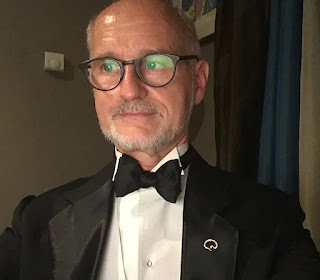
Both of you have won the Morley-Montgomery Award for the best article to appear that year in The Baker Street Journal. How did each of you decide on your topics and do you write solo or with the other one as part of the writing process?
Jessica: We’re both pretty big nerds on our own favorite topics, but as former news people, I don’t think either of us can resist the allure of a good story. This winds up being the best of both worlds — we’ve each got an in-house critic and editor should we want one, but neither of us is offended if the other asks their work to be a surprise!
Eric: Definitely we write solo — Jessica’s writing voice stands head and shoulders above my plodding prose, as these words demonstrate. But as a work comes together with that “click” of formation of the cohesive whole, it’s fun to pass the completed material to the other to get that first reaction of an initial read-through. I did have a bit of fun reproducing at full size the newspapers discussed in Jessica’s articles — complete with the appropriate holes cut with short-bladed nail scissors in the instance of the découpé warning in HOUN.
What book would you recommend to other Sherlockians?
Jessica: This might sound like it’s out of left field, but I promise it isn’t: I’m going to recommend Don Norman’s The Design of Everyday Things. Just as Holmes is constantly reminding Watson to lean harder into his observational abilities, Don Norman — one of the pioneers of user experience design — looks at ordinary objects with an eye to truly understand and disassemble how their design helps or hinders their users. In fact, if it had been a field in his era, I’d maybe even suggest that our good detective might have retired into a UX practice rather than beehives … but that’s just a hunch.
Eric: Be forewarned should you follow her excellent recommendation: you will then see the world as full of typos and exquisitely poor design. As befits my plodding linear methodology, when introduced recently to a local young teenager enthralled by her first canonical readings, we gave her a copy of Les’ Annotated (which Les kindly inscribed to her).
Where do you see Sherlockiana in 5 or 10 years from now?
Jessica: Barring any insider knowledge of an up-and-coming television franchise or film reimagining of our hero, my vote — or maybe, rather hope? — is that we continue to welcome more people, of more backgrounds, ages, races and interests, into this community both as we continue to stage more post-covid, in-person events and as we hopefully keep making get-togethers more accessible remotely. We’re all happy to be back meeting face-to-face again, but I think we’re all also aware of how many opportunities to meet others we had in the virtual space that might not have happened if it weren’t for those years of isolation! So, I’m rooting for the best of both worlds going forward.
Eric: That next surge of popular interest is likely not far off. There’s a study yet to be made of the potentially predictable periodicity of popular attention to the Master. We look forward to welcoming them and “their Sherlock".
August 4, 2024
He Didn't Like the Look of It [SHOS]

Benedict Cumberbatch is the Sherlock Holmes for a whole generation of Sherlockians.
And I've got the numbers to back up this statement. I gave talks to scion societies in Chicago and Dallas recently on an overview of the first 100 Interesting Interviews on this blog. One of the questions I've asked everyone is "How did you become a Sherlockian?" 28% of people asked said they came to Sherlockiana through media interpretations. And of those who answered that way, Basil Rathbone, Jeremy Brett, and Benedict Cumberbatch were the most cited names in that answer.
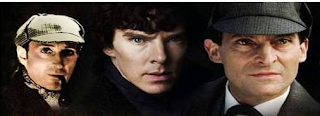
So, whether you liked Sherlock, Benedict Cumberbatch is the Sherlock Holmes for a whole generation of Sherlockians, just like Rathbone and Brett before him.
Male, female, straight, LGBTQ, or any other identifier: that voice and that coat is Sherlock Holmes right now to America (and I'm sure may other countries as well, but I'm not going to claim that I'm an expert on other countries' take on Sherlock Holmes).
So let's pull back on the Cumberbashing. Because we all know that the latter episodes of Brett's series were very bad, but many people don't want to denigrate the man. And heaven forbid someone badmouth the nonsense of Rathbone fighting Nazis and Nigel Bruce's idiotic sidekick role; people would start clutching their pearls.

If you were curious enough to click the link above, I stand by that assessment. I don't have a fond opinion of Sherlock; to quote my parents, "I'm not mad, I'm just disappointed."
But let's end this post on a positive note. Another thing I loved about reviewing the first 100 Interesting Interviews was how great, friendly, lovely, etc. that Sherlockians are. So we shouldn't lead with our dislike for certain things. I'm not trying to gatekeep and tell anyone to keep their opinions to themselves or that their opinions don't matter, but why put out a negative image of ourselves online? We are Sherlockians: we are amazing! Let that shine through, because I promise that we can enjoy one another without being negative about things.
July 29, 2024
A Recap of the Sherlock Holmes @ 50 Conference
What a weekend! The center of the Sherlockian universe was in Minneapolis, Minnesota last weekend as they celebrated the 50th anniversary of the University of Minnesota's Sherlock Holmes Collections. Over 170 people attended the conference that ran from Thursday evening to Sunday morning. The full schedule can be seen on the conference's website, so I won't retype it all here, because even without the itinerary, there is going to be a lot in this post!
I drove up with Joe and Peter Eckrich on Wednesday and we were able to visit with Dick Sveum at his house for a bit when we hit town. Dick personifies "Minnesota Nice" and getting to see his personal library was definitely worth getting to town early for.
The next morning, Joe, Peter, and I met Tim Johnson at the University Library for a personal tour of their Sherlock Holmes collection and then took in the exhibit that the library had set up for the conference that weekend and then a quick visit to the Baker Street sitting room recreation they have on the second floor. Seeing the underground storage facility that the University of Minnesota has for all of their collections was mind-boggling and trust me, these pictures don't do it justice.
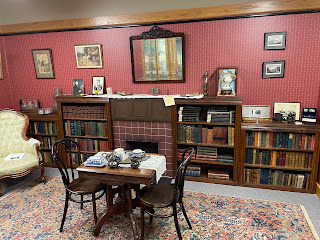
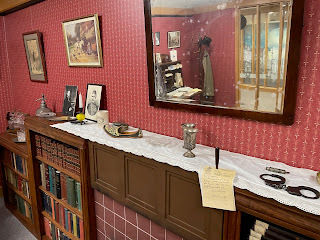
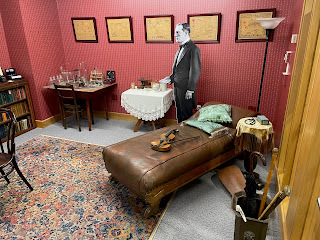
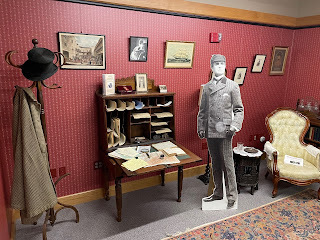
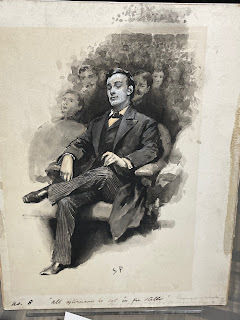
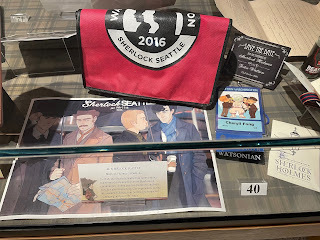
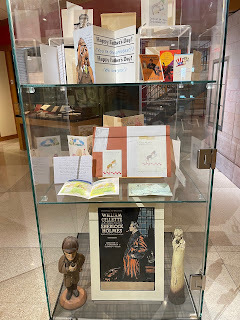
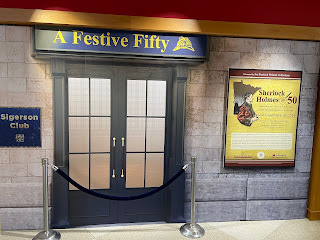
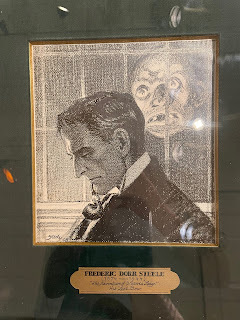
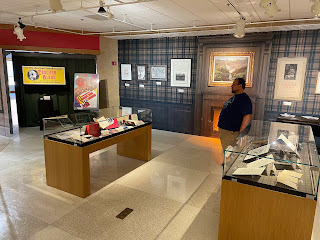
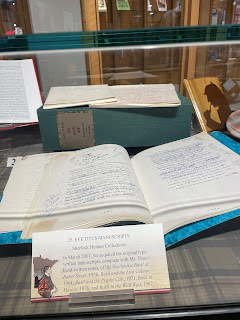
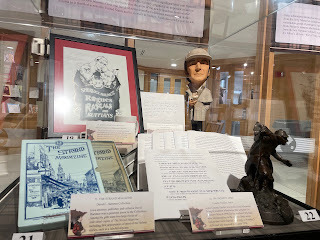
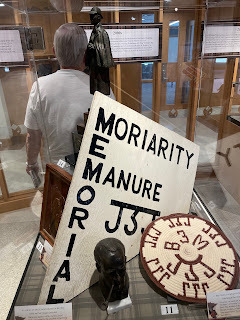
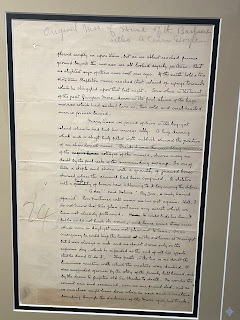
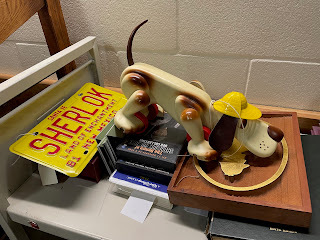
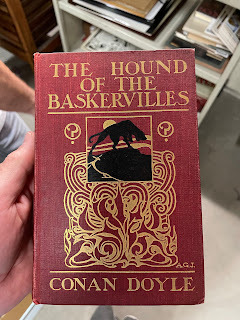
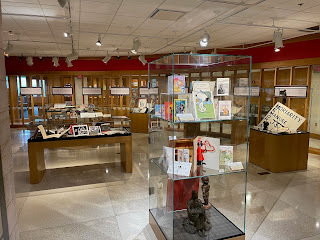
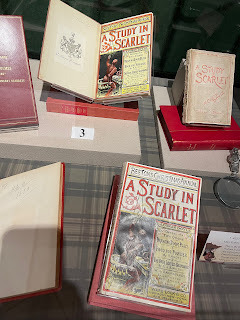
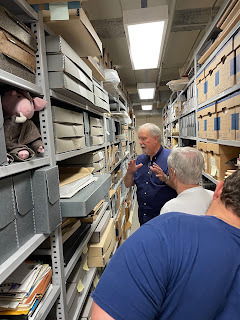

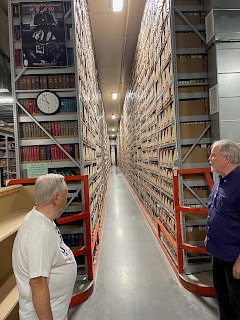

Arriving back at the hotel, people were starting to hit town, so we met up with some others and grabbed a quick dinner at the pub next door and then headed back to campus for the welcome reception. It should be noted that for this conference, the Norwegian Explorers had everyone set up in an off-campus hotel, but it was only a 10 minute walk to the library and there were plenty of restaurants within walking distance and a great lobby for us to fill up throughout the weekend. Whomever chose the hotel location should be commended!
After the welcome reception, 20 or so Sherlockians headed to a speakeasy across town. It had a cool vibe. So cool, that even though I knew the password, there was a moment where our group thought we weren't going to be let in. I clearly should not have been the one to try and gain entry. As you can see, there were much cooler people with me that would've been admitted immediately.
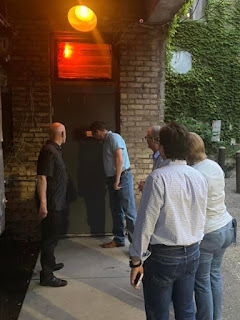
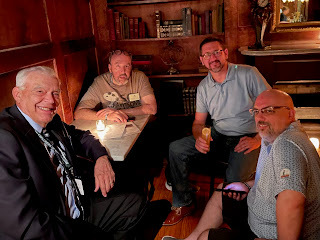
Friday's program didn't start until 12:45, so that allowed for groups to have breakfasts and lunches with one another before organized activities started.
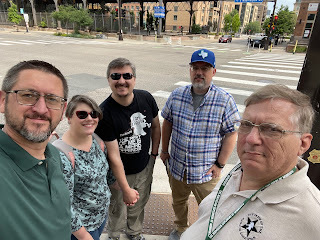
Friday's speakers were a great mix of scholarly and energetic takes on their respective topics. Rebecca Romney proved that young people are still reading and collecting Sherlock Holmes books, even though some fuddy duddies don't want to recognize that things may look different than it did in their time. (Fuddy duddies is my term, not Rebecca's.) Jim Hawkins shared his passion for spreading the gospel of John Bennett Shaw and Emily Miranker built on Shaw's spirit with her talk about the friendships she's built over her years as a Sherlockian.
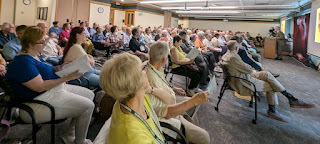
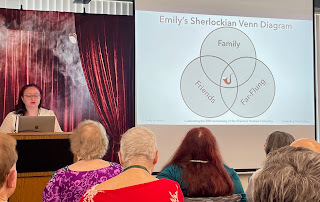
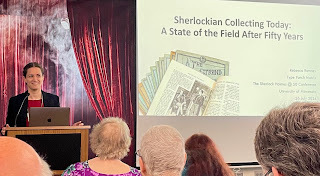
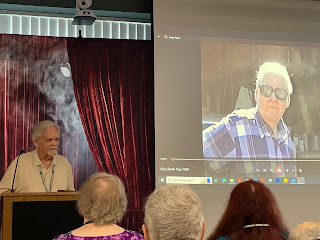
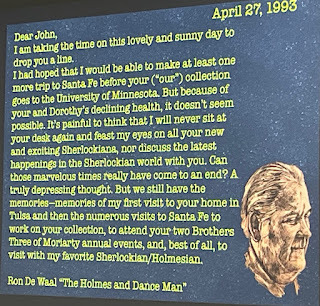
Up next was the annual meeting of the Friends of the Sherlock Holmes collection, in which Tim Johnson announced his phased retirement. He is going to take 2 years to retire, because he will be shepherding the University in obtaining Denny Dobry's sitting room as well as Jerry Margolin's Sherlockian art collection. You can see why he's going to need some time! Ira Matetsky spoke next about the importance of investigating in your local library. I hear many people talk about how they were motivated to see what their libraries had in their collections after his talk.
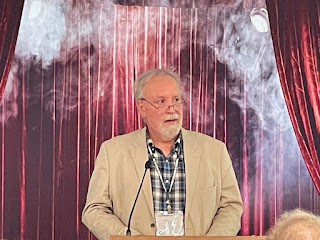
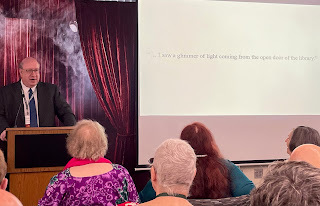
We were then released into the wild for the evening and I fell in with a rough crowd. I may be scarred for life:

Saturday was the big day, packed to the gills with programming for a room packed to the gills with Sherlockians. Eric Scace intertwined Victorian technology with the chronology of The Valley of Fear in his talk, Matt Hall got all sciencey with proving that phosphorus could have been used on Stapleton's hound on the moor, and Stephen Lee laid out a case for what we think of as Watson's blunders in his write ups were actually a clever conspiracy to help take down Moriarty.
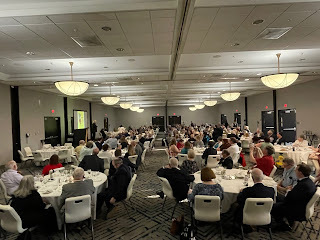
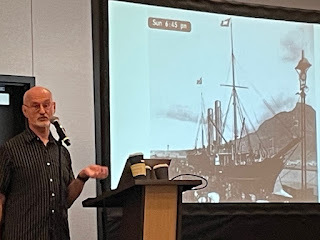
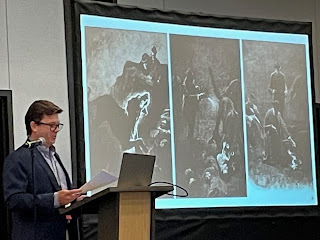
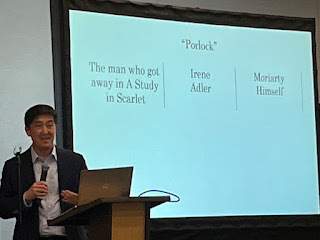
A nice lunch and time to spend money with the vendors followed. And I showed Greg Ruby how good I would look in a beryl coronet.
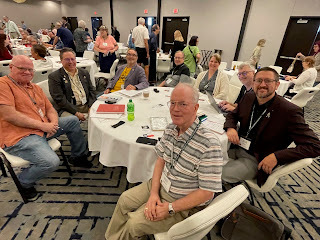
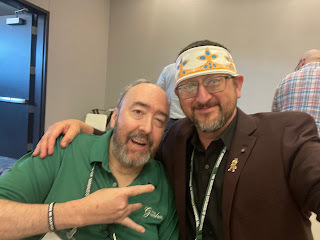
The afternoon sessions continued the high standard of interesting topics with Burt Wolder taking us through the life of Frederic Dorr Steele (and showing us the original color version of an illustration I'd never known had color), Will Walsh showing everyone how smart he is and how bad of an idea treason is, and Mark and JoAnn Alberstat making a strong argument that we can blame Canada for Professor Moriarty.
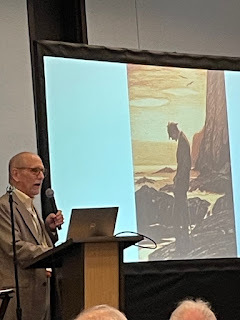
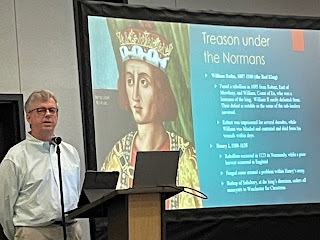
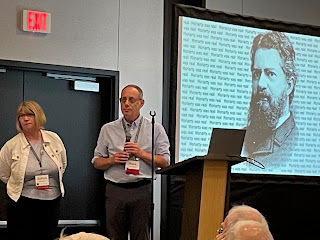
With some down time before dinner, I was able to lay out just how much new stuff I was taking home. The first picture is of my new stuff. The second one is a real selling point for the Minnesota conference: all of that stuff was included with our registrations!
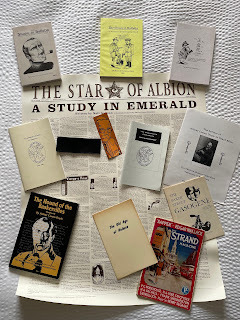
A cocktail hour followed the break and then it was time for a lovely dinner filled with toasts and camaraderie. The toasts were really impressive. Whether they were from seasoned hands or someone attending their first Sherlockian event, each one delivered in its own special way.
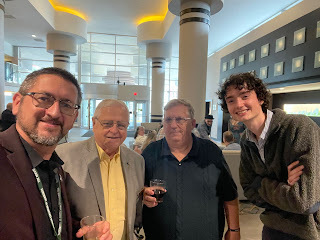
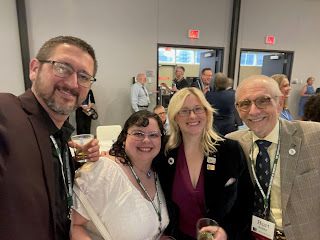
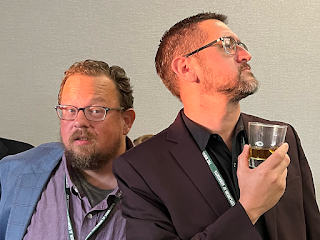

I had known just how many St. Louisans were heading up to Minnesota, but at some point on Saturday it dawned on me that outside of The Norwegian Explorers themselves, I think St. Louis had the largest representation of Sherlockians at the conference!

For the final night's socialization, over 50 of us descended on the bar next door's patio. This really sums up the allure of Sherlockian events for me. Everyone was hanging out and enjoying the company of others. Matt Hall convinced me what book I should read next, Eric Scace and I got in deep on the state of broadcast radio, and Erica Fair got recruited to help with the next 221B Con. And that was just at my end of the table! Just thinking about all of the people who were having great conversations out there makes my head spin.
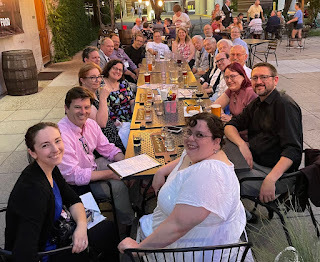
After the bar closed at (an unreasonably early) 11pm, the party moved back to the hotel lobby. No pictures exist from this and that's just as well as certain hotel chains may frown on the boxes of booze that somehow appeared in their main space. But let me tell you, it was another party!
Sunday wrapped up the event with two more speakers and a radio play. Max Magee infotained everyone with the history of Mrs. Beeton and her Christmas Annuals, Denny Dobry gave a tour of his sitting room and special consideration to how faithful adaptations have been to Dr. Mortimer's walking stick, and The Red-Throated League used talent both local and abroad to close the show.
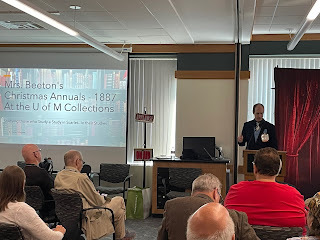
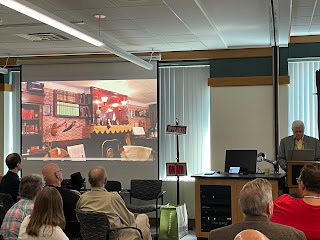
Has this been a long blog post? Yes. But this just skims the surface of the great stuff I got to be a part of Minneapolis.
Sherlockians time and time again prove what a wonderful group they are and I am beyond grateful to The Norwegian Explorers of Minnesota for provided and time and space for that to be proven once more. The planning committee should all be very proud of themselves for the work that they put in to creating an event that brought so much joy to so many people. From the heads of the event to the people working behind the scenes, thank you for an event that has shown us that Minnesota isn't just the center of the Sherlockian universe for one weekend every three years, but the standard for what we should all aspire to be.
July 21, 2024
Interesting Interview: Max Magee
This week, let's get to know a Sherlockian with a ton of energy, ideas, and friends. Max Magee is one of those people who once you meet, you just hang on for dear life because this guy doesn't slow down. As soon as you meet him, he feels like an old friend and is quick to jump into a conversation about any topic you like. In a hobby full of friendly and welcoming people, Max's friendliness somehow stands out as going above and beyond.
And ideas? Hoo boy, does Max have some! All reports of his talk from this year's Holmes, Doyle and Friends equated to, "This guy's great!" Max will also be presenting at the Norwegian Explorers conference at the end of this month. He's led a cemetery tour in Chicago, coordinated group outings in New York, and talked me into being interviewed on my own blog. I swear, the inside of Max Magee's head must look like an assembly line but populated with hyper-intelligent chimpanzees. So buckle up, because if this intro didn't tip you off already, Max has lots of ideas and stories ahead!

Max Magee
How do you define the word “Sherlockian”?
First, let me say that, even to myself, I tend to be overly long winded, so I’m going to give a short answer and a long answer and let the reader choose which they want to read (makes skimming mine easier). For those of my generation, we call that the principle of Too Long; Didn’t Read (TL;DR).
Short Answer: It’s already long, isn’t it? Oh well…I think a Sherlockian is anyone who just can’t or won’t quit loving Sherlock Holmes.
Long Answer: I think the term Sherlockian is occasionally used as a weapon (along the lines of Not a REAL Sherlockian, or calling someone else a good Sherlockian in contrast). Just like there are no true Scottsmen, but I believe that in those cases, the user of the term is in the wrong. This is a form of gate-keeping, saying that someone’s engagement is wrong. Although it’s an American term (the Brits seem to prefer Holmesian), it applies to anybody, anywhere, who loves some aspect of the Sherlockian and Doylian worlds and engages with it at whatever level they prefer.
In a talk I gave at the 2024 Dayton Conference, which I titled “Becoming A Sherlockian,” I defined five levels of Sherlockians, more or less as follows:
Finding and Enjoying Sherlock Holmes in any form
Reading the Sacred Writings (Canon), Doing Independent Research and Networking/Joining a scion
Reading it all - Canonical, non-canonical, apocryphal, sacrilegious(?)—Sherlock Holmes was an American!?
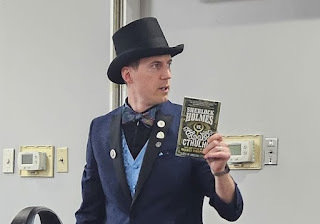 Stage 3 Sherlockians wear top hats!: Photo credit Kira Settinsgard (Sherlock Holmes vs. Cthulhu available here)
Stage 3 Sherlockians wear top hats!: Photo credit Kira Settinsgard (Sherlock Holmes vs. Cthulhu available here)
Joining the FUN (as Kit Morley put it, whiskey & sodality) - Writing, Researching, Sharing, Collecting, Recreating, Leading or forming a scion
Changing the Sherlockian World/Leaving a Legacy (Morley, Starrett, Shaw, Adventuresses, Doyle, too many to name, but you’ve probably heard of them)
How did you become a Sherlockian?
Short Answer: I was 36, and was reading some of the great literature that I may have missed along the way. When I got to the Sherlock Holmes Canon, I used Randall Stock’s bestofsherlock.com surveys to read the good stuff. I started by reading SCAN, SILV, HOUN, and I realized I had to find people to discuss it with! I found Bert Coules’ BBC audio dramas, and I really enjoy audio books (I learned a lot about British English pronunciation from narrators like Stephen Fry), although the illustrated stories on paper between board covers are the best.
Before I knew it, I had read nearly every story in a matter of weeks (at that point in my life I was traveling frequently for martial arts training and competitions, so audiobooks and audio dramas were tremendous for those torturously long drives). I joined the Notorious Canary-Trainers for their next discussion of CARD (and brought a cigar box with two dried apricots in coarse salt). From the shared joy in the story, the discussion, to the minutiae, and the challenge of recreation, I was hooked.
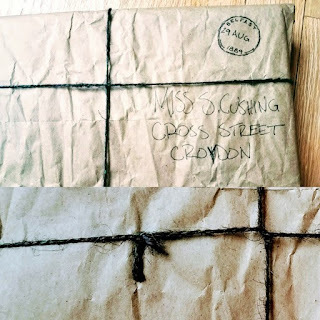
It’s one of the great regrets of my young life, because when I did return, I got so much joy and have made so many friends through our shared passion for Holmes and the Canon, that I feel I missed out on a lot (and missed my opportunity to know some people that I think I would’ve really enjoyed knowing). But alas, we can’t time travel yet (other than escaping into these old stories).
By the way, as an Eagle Scout, I particularly liked the challenge of determining which knot was uniquely nautical. The knot that was used on that package is a carrick bend. It's simple to tie and untie and lays flat—unlike a square knot. Also known as a Sailor's Breastplate, it can be used to join lines of different diameters and won't bind or lock up when wet. It can also be used as a decorative element, and since it's almost always used nautically (where other professions might also use a sheet bend, square, or granny to join their lines), it's a good choice…but I digress!!!
What is your profession (or previous if you are retired) and does that affect how you enjoy being a Sherlockian?
Short Answer: I’m currently a software development manager at a local Madison company that does emergency notification to anyone anywhere. I think my ability to write scripts and parse data is very helpful to some of the analyses and discovery I’ve done using digital copies of the Canon in the past.
Long Answer: In my previous life as an aerospace engineer for a NASA contractor, I helped to support, train, and launch the Space Shuttle. After living in Houston the better part of a decade, the Space Shuttle was retired, and I wanted to return to the midwest (I was born and raised in Madison and graduated from the University of Wisconsin with a degree in Engineering Mechanics and Astronautics).
My scientific background and love of physics makes me feel a kinship for Professor Moriarty. There are some really interesting tangents about the history of science in the Victorian era that I’ve learned about through Sherlock Holmes. For instance,the Dynamics of an Asteroid could also be described as the Three-Body Problem, and the Victorian contest contrived by Oscar II, King of Sweden and Norway to solve it in 1887, and how, in spite of not solving for a closed-form solution, Henri Poincaré was awarded the prize…but subsequently had to retract his paper, and reprint hundreds of copies out of his own pocket—at a cost more than the prize he received—as a result of a flaw found in it after printing had already begun.
I was also briefly the CTO of a short-lived cloud-based-artificial intelligence startup for real estate diligence. Since it never really got off the ground, it was really fog-based, I suppose. However, the knowledge I acquired of AI during that time informs my understanding of how difficult it is to achieve meaningful successes using machine learning and artificial intelligence vs. just developing really good algorithms or doing things by hand. This has also led to other interesting Sherlockian projects (see 2024’s Baker Street Almanac for a really weird one!).
In many ways, I think the development of modern technologies today, mirrors the rapid pace of technology evolution (from typesetting/printing to communications and vehicular travel) that was happening during the half-century covered by the Sherlock Holmes stories (or ~40 years of publication).
What is your favorite canonical story?
Short Answer: Currently, I’m really enjoying The Adventure of the Norwood Builder, although I have never considered it one of my favorites. My favorite of the novels is The Hound of the Baskervilles (although, I’ve never heard anyone mention my second favorite novel in these Interesting Interviews: How Watson Learned the Trick), in fact, Hound one of my favorite books of all time. If I had to pick a short story, Silver Blaze, because of how well it’s told.
Long Answer: Really, the way I navigated back into the Canon was through the Best-of- rankings on BestOfSherlock. I was hooked by those at the top:
1. "The Speckled Band"
2. "The Red-Headed League"
3. "A Scandal in Bohemia"
4. "Silver Blaze"
5. "The Blue Carbuncle"
6. "The Musgrave Ritual"
However, Silver Blaze stands out above the others because every page has something to discuss, it has a great train scene (and one of the best illustrations in the entire Canon).
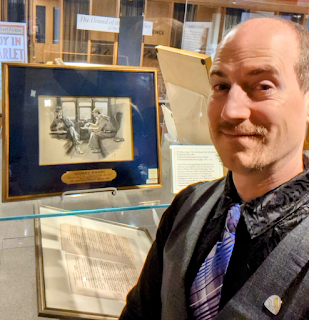 Glen Miranker, is so generous to share his treasures with the world. This was part of his 221 Objects displays (taken at its stop at the University of Minnesota)
Glen Miranker, is so generous to share his treasures with the world. This was part of his 221 Objects displays (taken at its stop at the University of Minnesota)
Who is a specific Sherlockian that you think others would find interesting?
Short Answer: Don Izban. He’s one of the head honchos of the Chicago Scions (and founder of several including STUD, the Torist International S.S., and the annual excursion called Canonical Convocation and Caper to Door County, Wisconsin). I’ve read a number of his publications, though I’ve only had the pleasure of his company once in person. We have had numerous rambling, uproarious phone conversations about all different sorts of topics. My favorite fun fact about Don is that he frequently claimed to have never read the Canon. (I secretly think he has.)
Long Answer: This question just seems like a way for you (Rob) to have us do your job for you, to pick your next interviewee. Otherwise, I’d say Madeline Quiñones (but you’ve already interviewed her), or Bob Sharfman (already recommended by Ann Margart Lewis) or Phil Cunningham. They are all great Sherlockians and wonderful, interesting people. One of my favorite things about Sherlockian Conferences is exploring the city in which they are held, and those folks are always up for adventures.
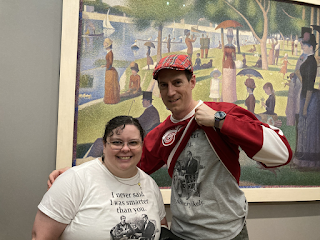 Here’s a recent picture of Madeline and me enjoying the Art Institute of Chicago during the latest Watsonian Weekend (we accidentally dressed in the same Sherlockian t-shirt): Photo courtesy of Madeline Quiñones
Here’s a recent picture of Madeline and me enjoying the Art Institute of Chicago during the latest Watsonian Weekend (we accidentally dressed in the same Sherlockian t-shirt): Photo courtesy of Madeline Quiñones
What subset of Sherlockiana really interests you?
Short Answer: Almost everything. Recently, I’ve been more interested in a Chronology project, but I also love learning about the origins of the hobby of being a Sherlockian and collectors. (To answer the inverse: what doesn’t interest me…I’d have to say bad pastiches—there just isn’t enough time to read that stuff.)
Long Answer: The tag-line and title of the Granddaddy (podcast) of Them All, I Hear of Sherlock Everywhere strikes me as an appropriate analogy for the way I encounter most things now. There are connections between Wordle, quantum computers, ENIGMA machines, and Dancing Men codes. I see the concept of quantum superposition as a great explanation for how Watson’s marriages, plot elements, and other “inconsistencies” or “impossibilities” could all co-exist in different realities—yet all probabilistically possible—at the same time.
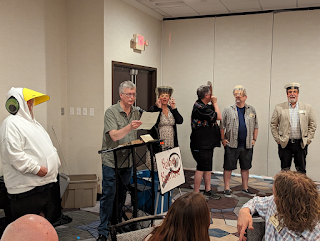 I think this picture speaks for itself (at the Holmes in the Heartland Conference, 2023)
I think this picture speaks for itself (at the Holmes in the Heartland Conference, 2023)
As a Sherlockain who gets out and participates in so many things, what are some highlights from all of your Sherlockian activities?
Short Answer: I’ve been lucky enough to visit a good number of local scion societies and their conferences, I’ve attended several BSI weekends, 221b Cons, and Norwegian Explorers Dinners. Of all of these, I think the most fun and most interesting overall experience I’ve had is the 2023 Holmes in the Heartland Conference (and I’m not JUST kissing the butt of the interviewer—the presentations’ lightheartedness, camaraderie, crowd, and events were so much fun and the biblical weather events, venue—including the workout space!—are some things I’ll never forget).
Long Answer: I think the short answer was long enough, but depending what you’re looking for, the Norwegian Explorers’ annual dinners, conferences, and publications consistently punch above their weight. The Explorers and Collections at the University of Minnesota are like a star whose gravity pulls the best of the Sherlockian world into their orbit. In fact, I can’t wait until next week for the first Triennial Conference I’ll be attending! (this was actually the short answer)
If you could pick one era of Sherlockiana to time travel to, when would it be and why?
What book would you recommend to other Sherlockians?
Short Answer: Now you’re speaking my language. If I had to pick one, I’d love to have been standing nearby in the Criterion Bar when Watson and Stamford met up, and I’d have followed them to the Holborn and on to St. Bart’s to hear that famous line “You have been in Afghanistan, I perceive.”
Long Answer: I debated between the Criterion Bar in the 1880s and Baskerville Hall in the 1640s—this was about the time of the Great Rebellion, during which the unfortunate events (Roysterers, a yeoman farmer’s daughter, etc.) referred to in the 1742 letter in The Hound of the Baskervilles took place. Unfortunately, I might be stranded and have to wait years or more (according to some chronologists) to get to the right year. If I had to pick one date we know for sure, though, I would’ve liked to have been in Milwaukee on Thursday, October 25th, 1894 to hear a young Arthur Conan Doyle on his first American speaking tour. At that event he may have even read a chapter from his upcoming Brigadier Gerard novel, the first section of which would be published in December 1894 in the Strand Magazine as The Medal of Brigadier Gerard.
Where do you see Sherlockiana in 5 or 10 years from now?
Short and Long Answer: Five to ten years is a short time and a long time—it’s short, as far as the hobby of Sherlockiana is concerned. But it’s a long time for new technologies, films, television shows, podcasts, etc. to develop.
I believe we’ll see more interconnectedness than ever before (I think you have to say this in these interviews because it’s been true ever since Doyle’s own day) travel, correspondence, electronic communications, video calls, etc. just make it easier and easier.
One trend I hope to see continuing is the scanning and making available resources and old journal articles. There are already fantastic resources, like Randall Stock’s page, mentioned several times above, but also the e-BSJ v2, and the Sherlock Holmes Society of London’s Scrapbook, and although it’s an expensive e-book (Kindle), Les Klinger’s New Annotated Sherlock Holmes is also a wonderful resource, particularly if you don’t already own the physical version.
What once took hours of combing through physical books (and potentially a trip or two to a collection or library in another state or another country) is now slowly making its way online. As copyright expires on the original works and permission is granted by the publishers of defunct journals, and as libraries scan and host their collections online (the HathiTrust is particularly amazing for this), I hope that more and more are digitized and made available for research.
One final bright spot is that parts of the United States are finally investing in their rail corridor (for the first time since its peak in the 1950s), and the new Borealis line just allowed the president of the Norwegian Explorers, Tom Gottwalt, to easily cruise on down to attend events at the Chicago scions’ Watsonian Weekend! I personally can’t wait until Madison is linked up with the other lines and we can have efficient, convenient, affordable rail travel again.
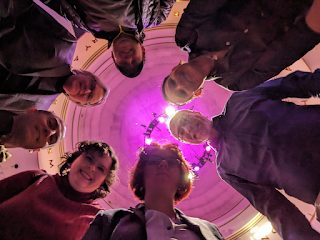 A gaggle of Sherlockians at the Museum of Science and Industry during one of the Torist events
A gaggle of Sherlockians at the Museum of Science and Industry during one of the Torist events
July 20, 2024
Interesting Interview: Rob Nunn by Max Magee
Editor’s Note: I decided to turn the tables on Rob, since he’s a good friend and I love reading his interviews. Well I am now amazed that he can get one of these out each month. From when I sat down to record him months ago, I’ve worked on this interview on and off for close to three months and I’m sure it’s nowhere near the high standards of editing he puts out on a much faster cadence. (Full disclosure, we talked for an hour on everything from Disney films to how to engage new readers to the Sherlockian hobby, to scotch, so maybe it was my meandering interview style that made the task all the more difficult.) My deerstalker’s off to you, Rob, this is not easy to do! -Max Magee
Rob Nunn, B.S.I. (2022 - Elementary) is a Sherlockian from Edwardsville, Illinois (near St. Louis, MO). By day Rob is a 5th grade teacher, and by night he is an author, blogger, and one of the leaders of the Parallel Case of St. Louis Scion. He’s also the principal organizer of the tri-annual Holmes in the Heartland Sherlockian Conference and a member of the [Nero] Wolfe Pack. Rob has recently taken up the mantle of Head Light of the Beacon Society. He’s written, edited, and contributed to many books including his debut novel, The Criminal Mastermind of Baker Street (2017), About Being a Sherlockian (2017), Sherlock Holmes of Baking Street (2021), an essay collection which he edited with Peter Eckrich, The Finest Assorted Collection (2022), and his latest, Canonical Cornerstones (2024).
Rob is funny, generous, knowledgeable, a doting father and husband, and an extremely nice person. Since how nice Sherlockians are seems to be the theme of ALL of these interviews…my first question to Rob is, will we ever see an interview with a complete a-hole? (The answer this month, of course, is no.)
So, will you?
Yes. Some day, I will interview you! But to answer the question seriously, there were some people who weren’t really my cup of tea, prior to the interview, but I still conducted the interview—and what they say is what I put up! I didn’t know if I would get along with this person until I interviewed them, but there was just one interview, maybe, where I walked away afterward and they were still not my cup of tea. But as a whole, every person I’ve interviewed has been great and/or won me over once I got to know them.
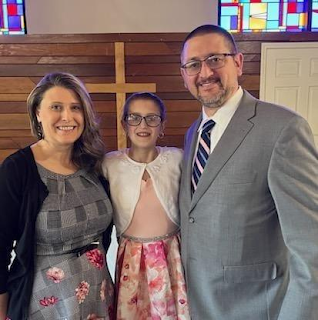 Rob’s wife Amy (left) and daughter Savannah (center) with Rob (right)
Rob’s wife Amy (left) and daughter Savannah (center) with Rob (right)
How do you define the word “Sherlockian”?
Anyone who takes their interest past a basic enjoyment of Sherlock Holmes (or even the shows). You need to go past that just a bit to be a Sherlockian. This includes re-reading, joining a scion society, doing original research, writing or any extra activity. Beyond just consumption.
At the beginning of the Interesting though Elementary project, I set out to answer the question (at the time there was a debate raging) and come up with a consensus about how we define Sherlockian. However, as part of the interviews, the answers were even more welcoming and far-ranging than I had expected.
How did you become a Sherlockian?
One year for Christmas, I was given The Complete Illustrated Sherlock Holmes (including all of the Sydney Paget Strand illustrations) from the parent of one of my students. My life as a Sherlockian took off from there, I read the rest of the Canon and Apocrypha before anything else, then tried some pastiches. Some clicked, some didn’t. When I discovered the essays and books of scholarship—classic Sherlockian anthologies, there was no looking back.
What is your favorite canonical story?
It’s always been Sign of the Four, (when I write it, I say The Sign of Four), it’s got everything. That boat chase down the Thames! When that boat pulls out in front of the police cruiser, oh man! And seeing Watson fall in love with his wife is wonderful. And TOBY! When he shows up in The Great Mouse Detective…I just love Toby.
I watch The Great Mouse Detective every year with my students. We conduct a two-week Sherlock Holmes unit with his 5th graders before a break (Thanksgiving, Christmas break, usually), and watch the film at the end of the unit.
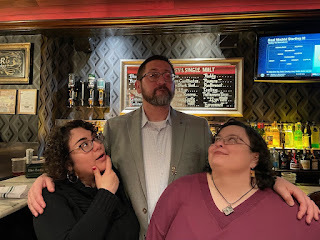 Tamar Zeffren (left), Rob Nunn (center), and Madeline Quiñones (right) thinking deep thoughts at the ASH Brunch at the Long Room in Manhattan at the tail end of the 2022 BSI Weekend
Tamar Zeffren (left), Rob Nunn (center), and Madeline Quiñones (right) thinking deep thoughts at the ASH Brunch at the Long Room in Manhattan at the tail end of the 2022 BSI Weekend
What subset of Sherlockiana really interests you?
Love the scholarship aspect. I love reading what other people research and ideas that they have that they can connect to the Canon. I’m continually amazed at how smart Sherlockians are.
One essay that sticks out in my mind is Paul Thomas Miller’s article in the BSJ: There was this Victorian He-Man who “created” amazing literary characters, was for divorce reform, ran for parliament, introduced skiing to an entire country, defended the downtrodden, and there was no way he could be a real human. He makes a convincing argument that Arthur Conan Doyle was a figment of John Watson’s imagination. It’s a chef’s kiss of an article. The argument is laid out so well, you get all of your facts, step-by-step laid out for you, and Paul is just a master of the twist ending. (Honorable mention to Paul’s Was Sherlock Holmes an Elephant…which takes a full 90 pages to answer that question, and the last line made me laugh out loud.)
What things do you like to research related to Sherlock Holmes?
I love historical research. Any time I can come up with a topic or am assigned a topic, I really love to delve in and see how it’s connected to the Canon. Phil Bergum asked me to write an article on railway travel for the BSI Press’ Haven Horror. It was so much fun learning about that stuff. I wrote about curried mutton for Sherlock Holmes of Baking Street. It inspired me to try it for the first time and I enjoyed it! I just love learning new things through a Sherlockian Lens.
 The infamous Scarlett Deerstalker from interestingthoughelementary.blogspot.com
The infamous Scarlett Deerstalker from interestingthoughelementary.blogspot.com
The Milwaukee Brewers are obviously the most storied franchise in the NL Central Division, but I noticed you have a Saint Louis Cardinals deerstalker (in that famous faded maroon color) on your blog. Are you a baseball fan, and how does baseball intersect with your Sherlockian Interests?
[expletive deleted] I love the Cardinals (even after last season), and there’s a story from (I believe) the 90’s, and somebody went to a Sherlockian costume party with a Cardinals jersey with “TOSCA” on the nameplate (a reference to the untold case of The Death of Cardinal Tosca in Black Peter).
You won't find much baseball in the Canon; however, Conan Doyle came to America and spoke very highly of the sport on his tour.
Recently we had a baseball outing that Steve Mason organized at the Holmes in the Heartland conference (2023) where a group of Sherlockians attended a Cardinals-Cubs 100 degree game. Busch Stadium has a great, family-friendly atmosphere.
As the Head Light of the Beacon Society, you are in an interesting position to answer a question you normally ask your other interview subjects: Where do you see Sherlockiana in 5 to 10 years, HOWEVER, I’m not going to ask you that yet. I’m going to ask you this: What do you hope for the future of Sherlockiana, the BSI, and other Sherlockian clubs and organizations? What are the biggest obstacles and opportunities you see to getting there (and how do we overcome those)?
I really hope for a lot of collaboration (or as you say, “cross-pollination”) and collaboration between societies, individuals, and even international connections. There was a wave of younger Sherlockians who found Sherlock Holmes through the Cumberbatch wave. They engage differently with the Canon and with Sherlock Holmes. My hope is this becomes more accepted and normal in Sherlockiana.
But the inverse also needs to be true. You’ve got to respect the history of the groups and individuals and the work that they put in over the years that has gotten us to where we are today over the past 130 years. You have to honor the past and the work that’s been done, while also moving things forward. I also think it’s important for all of us to not let our own egos get in the way of moving things forward.
It’s like with pastiches—I don’t really enjoy those, BUT just because it’s not for me, doesn’t mean it’s not good. I have to keep reminding myself that Sherlockians can enjoy the hobby in different ways but we all stem from the same place.
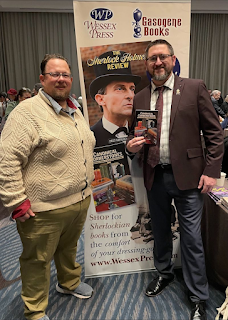 Peter Eckrich (left) and Rob Nunn (right) at the Dealer’s Room at the Westin Hotel in NY
Peter Eckrich (left) and Rob Nunn (right) at the Dealer’s Room at the Westin Hotel in NY
What book would you recommend to other Sherlockians and why is it your new collection that you edited with Peter Eckrich, Canonical Cornerstones (2024 from Wessex Press and Gasogene Books)?
Before I talk about Canonical Cornerstones, I want to talk about the book that I always recommend: From Holmes to Sherlock by Mattias Boström. It’s a perfect book from start to finish. It sums up what so many people have done in this hobby. When you start off talking about Conan Doyle and end up talking about Cumberbatch, he does it so well. He synthesizes what so many people have taken an entire book to do, he has combined into one tome between those two covers. It’s a gorgeous book from start to finish.
Speaking of gorgeous books…Canonical Cornerstones. I brag about this book and the previous anthology (The Finest Assorted Connection) all the time. I don’t feel bad bragging about them because I didn’t write those books. This book tries to decide on the seventeen items every Sherlockian should have in their Sherlockian library. There are amazing contributors in both of those. Whether you have read the title item in question or never heard of it, each essay came at it from different angles. All of the essays are well thought-out, impassioned, well-written, and bring a different viewpoint. From an editor’s standpoint, I’ve come to really appreciate the well-written essay. We hoped that this would stimulate the discussion of “Why wasn’t this book on there?” and the more books we’re talking about, the happier we’ll be. Seventeen beautiful essays by seventeen different writers.
Okay, now where do you see Sherlockiana in 5 or 10 years from now?
That goes back to a lot of what I was saying earlier. You’re going to see a lot more online. I LOVE all of the Zoom meetings that are always happening. Those Zoom meetings are allowing other people who would otherwise never be invited to the meeting to present. So you could have somebody from Nashville, TN, present in front of folks from California (editor’s note: Jim Hawkins of the Nashville Scholars was speaking to Scowrers and Molly Maguires of San Francisco the following day). You can’t keep track of it all! It’s really opening up the world of Sherlockiana. I hope that leads to a more collaborative world of scholarship and socializing. It also will help to open our world up to new people who don’t look and act the same as us. The more diversity the better!
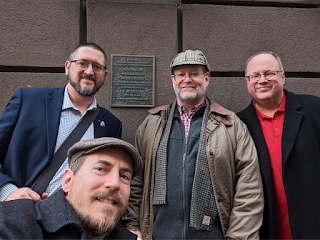 From top-left, clockwise Rob, Plaque dedicated to Nero Wofle, Archie Goodwin, and Rex Stout, David Marcum, Mike McSwiggin, Max Magee (editor of this interview)
From top-left, clockwise Rob, Plaque dedicated to Nero Wofle, Archie Goodwin, and Rex Stout, David Marcum, Mike McSwiggin, Max Magee (editor of this interview)
Trivia/Tidbits that Max and Rob discussed about the format of these interviews as Max was preparing one for Rob (with a couple of curveball questions he’s never seen):
The photos in his interview posts are mainly sourced from the interviewee (I assumed he went out of his way to locate entertaining or funny photos of the subject, but no!), otherwise he may source some from his own camera roll.
Rob really has gotten along with all of his interview subjects! (I even asked him off the record)
He loves learning new things through the Sherlockian Lens - he wants to start a new scion society for people who wear glasses named that (Interviewee’s note. Max and I were drinking when we did this interview and I don’t remember saying anything about a new scion. But I will gladly take credit for that idea.)
July 10, 2024
An Interview With John Watson
How many of us have actually wished we could talk with Sherlock Holmes or Doctor Watson? I have to say it's a thrill for me to have been emailing with the actual John Watson over the past few weeks to line up this special interview. (A quick shout out to producer Joel Emery for arranging this!) Now, some of you may be wondering just how that's possible. It's all because of the podcast Sherlock & Co.
The show started last October and is a great, fresh look at the adventures of a London detective. With almost ONE MILLION downloads every month, this is a show that is really worth checking out. The London Times called it as "the mystery podcast Gen Z is hooked on." While the article talks about how a younger generation has taken to it, I can't stress enough how much I enjoy Sherlock and Co.'s modern spin on mysteries that have typically been enjoyed through books or television. Even if podcasts don't seem like your thing, I really think Sherlock and Co. is something you'd enjoy.
But that's enough of my endorsement of the show. Let's hear from the man himself, Dr. John Watson!
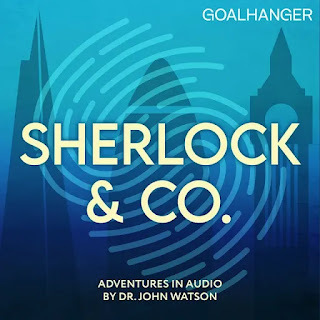
How would you describe Sherlock & Co. to people who aren't familiar with the show? And which case would you recommend as an entry point?
Sherlock & Co is essentially a true crime podcast. I take a (reasonably priced, sorry) microphone everywhere on our cases. 'Our' being Sherlock Holmes (he's a Detective) Mariana Ametxazurra (who runs our business, lives downstairs and used to work for Hudsons) and myself; Doctor John Watson.
If you want to know how we all met you should listen to 'Mr. Sherlock Holmes.' That's the first episode I recorded after I got back from Ukraine. Then I recommend 'The Illustrious Client' - that was our first case. I was fortunate enough to get dragged along and I haven't looked back. That's a lie.. I do look back quite a lot and think WHAT ON EARTH AM I DOING. But generally speaking I'll get past that personal crisis pretty quickly and move on with my day.
Most of our 'adventures' are self-contained. You can pick up any at any time and have a listen. It's not all about murder and mystery, sometimes people have problems that need solving. I can point you towards cases such as 'The Noble Bachelor' or 'The Creeping Man' for such instances.
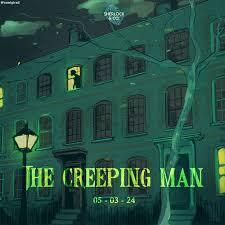
We learn in the first episode that you were a part of the British Army's Northumberland Fusilier Regiment. And by getting to meet your mother and Stamford in later episodes, we've gotten a few other insights into John Watson. Can you tell us more about your life before Sherlock & Co started?
So yes- you're absolutely right I was in the 5th Northumberland Fusiliers. I spent a lot of my time in the army obviously on tours in Afghanistan and Iraq- but also studying and furthering my medical degree. The British Army are very helpful like that when it comes to further education. Like many people, during and after Covid my life came to a bit of a crossroads. There was a tricky break-up and also the withdrawal from Afghanistan... Just when I was wondering what to do with my life - the humanitarian crisis unfolded in Ukraine and I initially went out there to assist in a medical capacity. I bumped into old friends from the army days and eventually transferred from inner city hospitals to a foreign legion.
Before all that of course - I grew up just outside of Swindon in the UK. I worked very hard at school so I could move a LONG way outside of Swindon - specifically London, that's where I met Stamford. I probably enjoyed myself too much at University and grades were stalling somewhat. They'll refer students to other concentrated areas of study when that's the case- I got referred to Netley. My Dad was in the army so it seemed like the right kind of fit.
What is one of your favorite cases that you and Sherlock have taken on?
You know what- we just got our teeth into an amazing case that I am currently editing and should be out by the time this article is. I'm calling it 'The Lion's Mane'. It felt so different to our other cases - we found ourselves on a remote Scottish island after the body of a man was found floating on the North Sea in his boat. His remains were.. I mean.. pretty gruesome.
To watch Sherlock pull on a few meagre threads and pull together the resolution of this case in particular was amazing to watch. Sometimes I'm really, really involved in cases- sometimes I feel like a listener like everybody else! Aside from that one- my favourite case is probably 'Silver Blaze'. That case had everything.
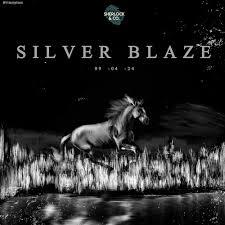
How has your life changed with the popularity of the show?
I feel like I'm online more! I feel guilty a lot of the time that I can't keep up with the level of correspondence the show receives. So I apologise to people for that. It makes you think about your life more I suppose, people want to know more. Our patreon (patreon.com/sherlockandco) even allows people to listen to Q&A episodes with myself and Sherlock answering questions from the fans. Sometimes questions pertain to a case, but most of the time they want to know our favourite cheese or where we went to school etc.
You let your microphone run quite a bit to pick up anything that might relate to your cases. Has that led to any embarrassing or uncomfortable situations?
Yes. I spend an enormous amount of time trying to edit out my embarrassing moments but unfortunately they are sometimes tied right into the narrative of a case. Like trying to untangle a very stubborn knot. Speaking of knots- 'The Cardboard Box' is another adventure I recommend.

I am someone who is a little too out of touch to understand Discord, can you describe the app and the interactions on it?
Discord is basically an app that allows a community to discuss en masse! I like the fact that I'm describing something to people that I, myself, only really discovered about a year ago. When run and managed well (our moderators do an excellent job at that) the Discord 'channel' offers lots of separate rooms and areas for discussion on all manner of subjects relating to the show, our cases, us as people and the listeners themselves.
Plenty of friendships have been formed through the show and Discord has been so important in making that possible. I will also pop into the Discord every now and again in what is known as a 'Johnline'.
Mariana is a great addition to the show and I love when she's a part of the investigations. What do you and she talk about that isn't work related?
At the moment: football! But generally we will chew the fat on just about anything. We talk about Sherlock a lot. We often find ourselves comparing what our lives could have been before we met him and before we formed this company together. I think that's just a sign of how much these cases really do feel like 'adventures' to us. I hope they do to Sherlock and the listeners as well.
I have to say I was a little disappointed that you couldn't identify Johnny Cash lyrics at the beginning of 'The Dancing Men' case. Can you make my American heart happy and tell us that you at least know a Dolly Parton song?
Well I can tell you that 'Islands in the Stream' is probably one of my favourite songs of all time! In fact I'm gonna go put it on after this interview now that I've thought about it. Yeah I had a moment of idiocy when I froze trying to get that Johnny Cash moment in 'The Dancing Men'. It was on the tip of my tongue.
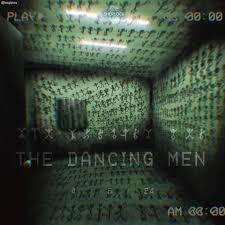
What is a book that you would recommend to Sherlock & Co. listeners?
Oh man. I don't know! I like dramatic reads about real things so Michael Lewis is great for that. I'm a big fan of Ian McEwan. Like many people my age my attention span is gradually collapsing and turning to mush, so I plan on rebooting my love of books. I've been told that our show itself has been beneficial to many in terms of concentration spans. Especially to those with ADHD, so maybe I should listen to my own show more, who knows.
A friend of mine is trying to teach himself the Sherlock & Co. theme song on his harmonica. Would you consider that to be flattering or a stupid thing for him to spend his time on?
A FLATTERING AND INDEED NOBLE AIM I SAY! Let the man Harmonica, Rob! Look forward to hearing it.
Can you give us an insight into what we have to look forward to in your next episode?
If the timing works well- I'd say a far off island. An isolated, rugged community coming to terms with the death of one of their own.
July 7, 2024
Well, Well, Such is Fame! [EMPT]
According to Watson's narrative of "The Empty House," Sherlock Holmes returned to life and active practice in the Spring of 1894. Yet this story wasn't published until September of 1903 in America and October of that year in England. Why is the publication date important? Because a look at the publication dates (or when they were allowed to be published) may give us insight into Holmes's true feelings of Doctor Watson's writing career.
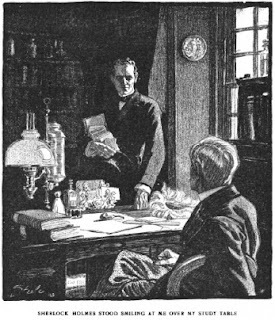
As most Sherlockians know, Sherlock Holmes faked his death in 1891, specifically May 4, 1891. But for the purpose of this post, that story's publication date of December 1893 is also important.
A few other dates to note before we move on. Most chronologists date that the Holmes and Watson partnership began in 1881. So we can look at his active years as 1881-1891 and 1894-1903.
Now, let's look at the publication dates of Watson's narratives.
A Study in Scarlet was published in 1887.The Sign of the Four was published in 1890.The Adventures of Sherlock Holmes were published between June 1891 and June 1892.The Memoirs of Sherlock Holmes were published between December 1892 and December 1893.The Hound of the Baskervilles was serialized from 1901–1902.The Return of Sherlock Holmes were published between October 1903 and December 1904.His Last Bow were published pell-mell throughout 1908–1917.The Valley of Fear was serialized from 1914–1915.The Case-Book of Sherlock Holmes were published sporadically from 1921–1927.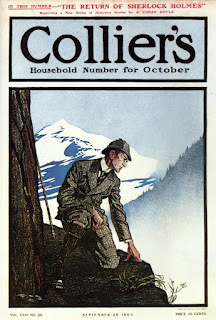
So, only A Study in Scarlet and The Sign of Four were published during the first part of Holmes's active years. Holmes "dies" and Watson publishes the 12 stories that make up The Adventures soon after.
The first four or five stories of The Memoirs were also published after Holmes's "death." We can presume that Watson was under contract to present 12 cases to readers of The Strand during this run. Holmes reappears in 1893 during this run, and the other seven or eight cases of The Memoirs are published. So there's a brief overlap of Holmes's return to active practice and Watson publishing in The Strand, but it's important to note that this collection ends with Watson publishing "The Final Problem," in which he tells the reading public that Sherlock Holmes had died.
Nothing else appears in print until 1901 when the serialization of The Hound of the Baskervilles begins, but in it Watson is careful to point out that this is a story that happened before Sherlock Holmes died.
So remember readers, Sherlock Holmes is dead.
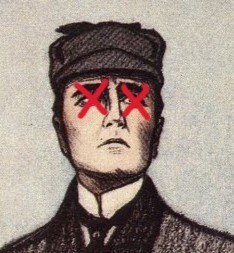
Holmes then retires in 1903, and we see the other 33 cases come into print.
So, out of the 60 stories that make up the Sherlock Holmes Canon, only 10 or 11 were published during his active years. And of those, 7 or 8 of them were published right after Holmes's reappearance. Why were so few cases made available during Holmes's active years? I think it's because Sherlock Holmes did not want the publicity that The Strand Magazine was bringing him.
In fact, "The Empty House" gives us a specific quote that shows how Holmes felt about what Watson was publishing. As they set up their vigil in Camden House, Holmes refers to Baker Street as "the starting-point of so many of your little fairy-tales."
Ouch.
We often think of Doctor Watson's narratives as great publicity for the detective, but looking at the hard data, it seems as if the stories were almost purposely held back until Sherlock Holmes was not able to be engaged by every person who read about him in The Strand.
At the end of "The Empty House," Holmes gets the bad guy and everything is back to as it should be. Holmes says, "Once again Mr. Sherlock Holmes is free to devote his life to examining those interesting little problems which the complex life of London so plentifully presents."
But just don't tell anyone he's back in town.
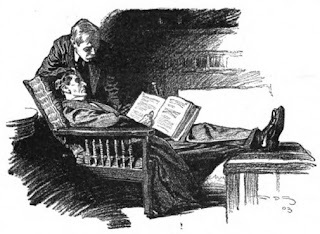
June 16, 2024
Interesting Interview: Roger Johnson
Oh boy, this is an interview I've been wanting to do for a long time! Ever since I started emailing with Roger Johnson a few years ago, I knew I wanted to do an Interesting Interview with him. But holy cow, is this guy busy! Let's do a quick rundown of some of his activities: editor of The Sherlock Holmes Journal, Press and Publicity Officer of The Sherlock Holmes Society of London, makes multiple television appearances about Sherlock Holmes, maintains the 221B sitting room at The Sherlock Holmes Pub along with his wife, Jean Upton, contributor to the Arthur Conan Doyle Encyclopedia, member of the Baker Street Irregulars and the Adventuresses of Sherlock Holmes, etc., etc. etc. (As an aside, one of the pictures in this week's interview was actually taken by Mark Gatiss. I'll let you try and deduce which one.)
As you can see, Roger has every reason to say he's much too busy to answer questions for a little blog in America. But when Canonical Cornerstones came out, I tried to interview every contributor and Roger's life wasn't allowing time for it then. But instead of just saying no like so many folks would have, he kept apologizing and asking me to come back around at a later date! Over the past few years, I've been lucky enough to email back and forth with Roger for a few things, and his charm just radiates in every message. One of my Sherlockian bucket list items is definitely getting to meet Roger Johnson and Jean Upton in person some day because they must be the nicest people in Sherlockiana. So enough of me prattling on about how great Roger is, time to see for yourself!
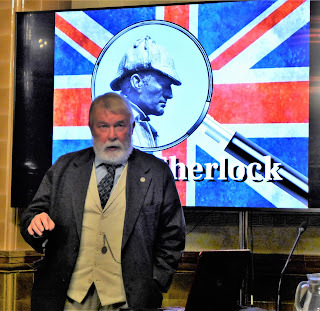
How do you define the word “Sherlockian”?
To me, “Sherlockian”, as an adjective, simply implies some sort of a relationship or a relevance to Sherlock Holmes. As a noun, I take it to mean a person with a considerable interest in the character, the canonical stories, and anything or – in extreme cases – everything relating to the character and his world. On the whole, I prefer the term “Holmesian”, since throughout the canon there are only two people who call the great detective by his given name: his brother Mycroft, and Mr Sherman, the bird-stuffer of no. 3 Pinchin Lane, Lambeth, who has evidently known him for a good number of years, and calls him “Mr Sherlock”. Even Watson, who surely knows him better than anyone outside his own family, always addresses him by his surname, and only refers to him as “Sherlock” to distinguish him from Mycroft. That was the way of middle- and upper-class society in late 19th century England. (In the TV series Sherlock, of course, Holmes and Watson address each other by their given names, which is absolutely right for the early 21st century.)
How did you become a Sherlockian?
Good question! And I’m not sure I can come up with a good answer. I was born in 1947, and the first Holmes book I remember reading was The Hound of the Baskervilles; I couldn’t have been much under eleven, because that was the age at which one graduated from the children’s section to the adult section at the public library. I’m sure I must have read some of the short stories before then, but at what age… No, I can’t be certain. I was reading fluently at the age of four, and I seem always to have been aware of Sherlock Holmes, though in 1950s England there were no children’s editions of the stories. We didn’t get the Rathbone films on television until much later, and the Ronald Howard films weren’t shown on British TV until about twenty years ago, so I didn’t see a serious dramatised version until The Speckled Band, with Douglas Wilmer and Nigel Stock, in 1964, by which time I was seriously hooked on the stories. And throughout the fifties and sixties we did have the classic BBC radio series with Carleton Hobbs and Norman Shelley. (Hobbs’s, to me, remains the voice of Sherlock Holmes.)
In the early 1960s, I discovered August Derleth’s chronicles of Solar Pons, “the Sherlock Holmes of Praed Street” They were published in America, of course, under Derleth’s own imprint Mycroft & Moran, but they were available by post in the UK from G Ken Chapman, “Exclusive Representative in Great Britain of the Arkham House chain of Publishers”. At first I had the books, one by one, addressed to me at my school, because I didn’t want my parents to know how much I was spending on them. Then I learned of The Praed Street Irregulars, the Solar Pons appreciation society, founded by Luther L Norris of Culver City, CA. Luther, you’ll know, was a member of the Baker Street Irregulars and of the Sherlock Holmes Society of London. He encouraged four of his friends to write to me, and they quickly became my friends too, so American Sherlockians actually preceded British Holmesians in my list of contacts. And it was Luther who advised me how to apply for membership in the Sherlock Holmes Society of London, which I did shortly after the Society’s first Swiss Pilgrimage in 1968.
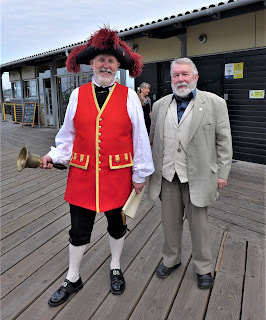
What is your profession (or previous if you are retired) and does that affect how you enjoy being a Sherlockian?
Until taking early retirement at sixty, I was a librarian in a major public library, so at work, as well as at home, I lived among books. As you may imagine, the resources available there were enormously helpful: general and specialist encyclopaedias and dictionaries, historical and geographical directories, and so much more. By the time I retired, fortunately, I could consult the county library’s catalogue online, and now much of the reference material I need is likewise accessible online. This passionate pursuit of ours isn’t exclusively literary, of course, but without literature it wouldn’t exist.
What is your favorite canonical story?
Of the long stories, I have a special fondness for The Valley of Fear. Some significant Holmes scholars have dismissed it as unworthy; one I remember called it “gloomy melodrama”, and others complained about the division into two separate narratives, though they seemed happy enough with the same arrangement in A Study in Scarlet. In fact The Valley of Fear gives us Holmes and Watson at their best in an outstanding detective mystery, alongside a superb early instance of the American “hardboiled” genre, and the two neatly tied together at the end.
There are various of the short stories that particularly appeal to me: “The Red-Headed League” for its delightfully bizarre premise; “The Blue Carbuncle” as the essential Holmesian Christmas tale; “The Speckled Band” for the wonderfully vile Dr Grimesby Roylott and his insidious reptilian weapon; “The Greek Interpreter” for introducing Sherlock’s even more extraordinary brother… But as my favourite, I’ll opt for “The Bruce-Partington Plans”, which is the story that has everything.
All right, almost everything. Mrs Hudson and the Baker Street irregulars are absent, but we have Inspector Lestrade and Mycroft Holmes, both on cracking form. There’s murder, espionage, treachery and the theft of a secret state document – and the London Underground Railway, all in the most appropriate atmospheric conditions imaginable: a magnificently described fog, such as we almost instinctively associate with the exploits of Sherlock Holmes, though it features very rarely in Dr Watson’s chronicles, and only in The Hound of the Baskervilles is it used as effectively as here.
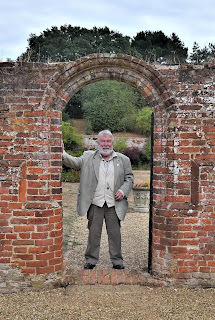
Who is a specific Sherlockian that you think others would find interesting?
It’s a very wide field, so I’ll make my choice from those who have contributed to the literature of Holmes and his world. Several of Michael Harrison’s books are likely to appeal, especially In the Footsteps of Sherlock Holmes and The London of Sherlock Holmes. D Martin Dakin’s A Sherlock Holmes Commentary is a masterly survey of the canon, though I think few will support his dismissal of half a dozen or more of the late stories as “spurious”. Leslie S Klinger’s New Annotated Sherlock Holmes is a superb achievement, which enhances the reader’s appreciation of the Holmesian canon. And more recently there’s Mattias Boström’s From Holmes to Sherlock. For some unfathomable reason it was released in the UK as The Life and Death of Sherlock Holmes, a title that gives a completely wrong impression of the author’s theme, which is the development of the great detective in literature and drama. It’s a big book – nearly 600 pages – but Mattias’s scholarship is outstanding, his research is meticulous, and the English translation is a pleasure to read.
Les Klinger and Mattias Boström are very much active today, but the Sherlock Holmes scholar whom I particularly commend is the late Bernard Davies. The following is extracted from the obituary I wrote for the Sherlock Holmes Society of London’s website in October 2010:
When Stephen Fry spoke at the Sherlock Holmes Society of London’s annual dinner in 2005, almost the first statement he made was: “To be in the same room as Bernard Davies is a remarkable honour.” I don’t think that any of us who knew Bernard would dispute that. At that same dinner, to unanimous acclaim, he received the Tony Howlett Award in recognition of his decades of outstanding service.
In 1958, having long been a devotee of the great detective, Bernard discovered the Society and realised that he was not alone. Almost immediately he made his mark with his essays “Was Holmes a Londoner?” and “The Back Yards of Baker Street” – the latter establishing beyond any reasonable doubt the true location of 221B Baker Street. They were the first of thirty or so major papers on Holmes, Watson and their world – writings of exceptional quality, all but two written for The Sherlock Holmes Journal or for the Society’s occasional handbooks.
He would not publish an article until he was satisfied that it was as good as he could make it, and there was no collection of his Holmesian writings until 2008, when the Society published Holmes and Watson Country: Travels in Search of Solutions in two large volumes. Bernard’s research was scrupulous, his results were marshalled with intelligence and discrimination, his presentation was clear and comprehensible, and the whole was marked by wit and an engaging enthusiasm.
Although he had not then attended the Baker Street Irregulars’ annual dinner, and had never contributed to The Baker Street Journal, in 1984 Dr Julian Wolff awarded him the Irregular Shilling and dubbed him “A Study in Scarlet”. As Jon Lellenberg so felicitously said: “for Julian, no greater compliment was imaginable than to give him the investiture Vincent Starrett had held until his death in 1974 – the very first one conferred, in 1944, by Christopher Morley and Edgar W. Smith.”
What subset of Sherlockiana really interests you?
I’m particularly interested in presentations of the stories and the characters, whether dramatic or comedic, on stage, screen, radio, CD, or whatever medium. The movies – classic or otherwise – are now mostly accessible, and often via media that would astonish our grandparents. Much the same applies to audio recordings. The number and variety of Sherlockian dramas and comedies has increased to an extent that was hardly imaginable thirty years ago. The expiry of the last American copyrights appeared to usher in a new golden age, though I think it’s actually closer to what Mark Twain called a “gilded age”: the excellence is there for us, but there’s also a potentially unlimited quantity of dross. No matter! We are not obliged to bother with the dross. Few would have thought, even thirty or forty years ago, that we’d be able to enjoy so many various interpretations of the great detective, from the silent era – including a superbly restored print of William Gillette in a screen adaptation of his own play – to the present day.
Some years ago I directed and acted in a series of professionally produced Sherlock Holmes plays for hospital radio, with friends from my local amateur theatre company. The recordings are posted on the SHSL website, where you can listen or download them.
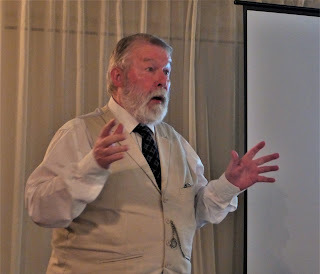
As a long-time editor of The Sherlock Holmes Journal, what are some memories that stick out from your tenure?
For most of its seventy-plus years, a team of two has been responsible for editing the Journal. I call myself the Commissioning Editor, as my job is to choose the content, text and illustrations, and write or commission the appropriate editorial sections. Then I pass the result over to my partner-in-crime, Heather Owen, who attends to the layout and forwards the result, after proofreading, to the printer-distributors. In 2006, my predecessor Nicholas Utechin completed an unbeaten 30 years in the editor’s chair; Heather had joined him as co-Editor on the Summer 1983 issue, and she’s still going strong. As they say, do the math!
It's Heather who’s responsible for one of the outstanding memories of my tenure. In the Summer 2012 issue she introduced the first full-colour illustrations – only the centre pages, but the reaction was generally positive, and gradually the use of colour spread, until within three years it had its place throughout the issue. The next stage, which came in 2019, after a good deal of debate among the Society’s council, was individual pictorial covers for each issue and a radical rejigging of the internal layout. (Those who regretted the disappearance of the one-legged newsvendor from the front cover were relieved to find him at his new post on the contents page.)
Memories of people and events that we recorded in the Journal? Obviously, over a period of nearly 18 years there were far too many to list here. There was the wonderful exhibition at the Museum of London in 2014-15, Sherlock Holmes: The Man Who Never Lived and Will Never Die. My wife Jean Upton and I gave some assistance, as did other members of the Society, and it was a delight to have privileged access along with the likes of Glen Miranker and Constantine Rossakis, who had loaned material from their own world-class collections.
The Society has arranged many visits to sites of Holmesian and Doylean interest, but the long weekend in Edinburgh in 2009 was truly special, as we were celebrating Arthur Conan Doyle’s 150th birthday. Two years later we marked the Society’s 60th anniversary with a special “Diamond Supplement” of the Journal. Over the years we’ve been treated to dramatic and comedic interpretations of Holmes, Watson and their world: among many others, there are the entertaining blockbuster movies with Robert Downey Jr and Jude Law; the now-classic re-imaginings on TV, Sherlock and Elementary, from the UK and the US respectively; and the poignant Mr Holmes. There’s also an encouraging number of stage plays, often good and sometimes outstanding.
The memories aren’t all happy, of course. During my time as editor, we’ve lost a disconcerting number of Sherlockian and Holmesian friends, including Dame Jean Conan Doyle, Bernard Davies, Nick Utechin, Ted Schulz, Jon Lellenberg, Tom Stix and Michael Whelan. It was the latter two who invested me and Jean respectively in the Baker Street Irregulars.
Being married to a fellow Holmesian must be a real treat. How does this shared interest enhance your enjoyment of the hobby?
Jean and I were married in 1991, so we’ve been sharing our lives and our peculiar hobby for more than three decades. I have to confess that my work for the Society, which encompasses quite a bit more than editing the twice-yearly Sherlock Holmes Journal, means that Jean doesn’t get as much time to appreciate the Sherlockian world as she should. That’s one reason why I shan’t be sorry to relinquish responsibility for the content of The Sherlock Holmes Journal when I retire as Commissioning Editor at the end of this year.
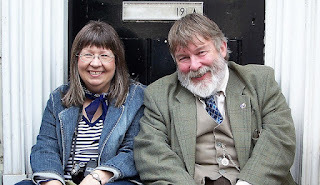
What book would you recommend to other Sherlockians?
Three come to mind, and they probably won’t surprise you. The New Annotated Sherlock Holmes, edited & annotated by Leslie S Klinger (W.W. Norton – 3 volumes); From Holmes to Sherlock: The Story of the Men and Women Who Created an Icon by Mattias Boström (Mysterious Press) [otherwise The Life and Death of Sherlock Holmes: Master Detective, Myth and Media Star (Head of Zeus)]; and the one that has to come first, if only because I prepared it for publication: Holmes & Watson Country: Travels in Search of Solutions by Bernard Davies (The Sherlock Holmes Society of London [2nd edition, 1-volume paperback]).
Where do you see Sherlockiana in 5 or 10 years from now?
It will still be active, nationally and internationally. Another phenomenon like Sherlock would almost certainly spark a renewed public interest in the canonical stories as well as the many books, magazines, and so forth that are bound to come – but that’s not a necessary factor. Conan Doyle’s sixty long and short stories are at the heart of it, and they’ll ensure that Holmes, Watson and their world continue to live.
June 9, 2024
Interesting Interview: Liese Sherwood-Fabre
Liese Sherwood-Fabre was inducted into the Baker Street Irregulars this year, and when her name was announced, the thought "of course, that makes sense" popped into my head. Whenever Liese is around, it just feels like a good fit for her to be a part of any group. She just has a cool demeanor that her make you feel like her writings and knowledge should always be a part of a conversation.
Liese describes her writing style as "good old-fashioned, gimmick-free storytelling" and that comes across on the page, at meetings, or just in general conversation with her. She's been a mainstay at the New York Birthday Weekend and 221B Con for years now and has friends all across this hobby of ours. Her writings are as varied as you can imagine. When I saw her in Atlanta earlier this year, she was telling me about a new children's book about a teenage witch. Quite a change from her popular Sherlockian writing! But speaking of writing, let's see what Liese Sherwood-Fabre wrote for her answers to this week's Interesting Interview!

How do you define the word “Sherlockian?”
At its base, of course, is an interest in Sherlock Holmes, but it must be more than a casual interest. There’s often an aspect of fandom involved as well—a desire to learn more, read more, and discuss your interests with others. Meeting other Sherlockians is one of the most enjoyable aspects of discovering and joining a scion. Despite a diversity of professions, they all have a common interest in reading and discussing the cases to learn more about Sherlock Holmes. At the same time, this interest takes different avenues. Some have focused on Sherlock Holmes as portrayed in film; others, games related to Sherlock Holmes and mystery solving; others, collecting autographs of actors who portrayed the detective; and so many other different ways to collect or study his impact on popular culture.
How did you become a Sherlockian?
I cannot identify when I first read a case from the Canon, but I do recall being very aware of mass media characters (including those in cartoons) who put on a deerstalker hat and carried a magnifying glass as imitating the detective who appeared in the old black and white Basil Rathbone movies.
When Robert Downey, Jr. re-ignited a popular interest in Sherlock Holmes, I considered writing a novel about the man. I had already penned several other stories and novels (some of which had won awards), and I thought about a new spin on him, focusing on his origins. That has become my Early Case Files of Sherlock Holmes series.
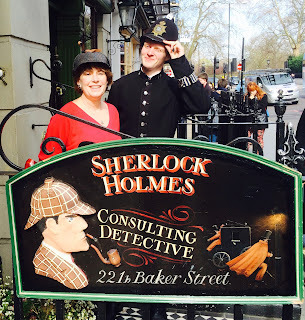
What is your profession and does that affect how you enjoy being a Sherlockian?
I hold a PhD in Sociology from Indiana University. I have to say that I’m fascinated by how the Victorian period affected the characters in the cases. In particular, I discovered how this period opened new arenas for women through my research. The typewriter and the bicycle offered new careers and mobility that women in prior periods did not have. The Canon documents these changes in some of the cases.
What is your favorite canonical story?
“The Adventure of the Cardboard Box.” At its heart, it’s a psychological thriller. How Sarah Cushing manipulated Jim Browner to murder his wife and her lover was absolutely diabolical. Moriarty may have been the spider at the center of his web of crime, but she was just as cunning—only on a micro-scale.
I also like this story because she becomes afflicted with “brain fever,” which I find a most fascinating condition. Today, we might call it a nervous breakdown. Others did experience a bout of it in a few other cases. A major treatment was shaving the afflicted’s head to cool off the brain.
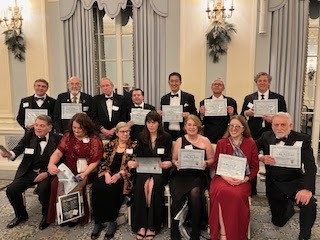
Who is a specific Sherlockian that you think others would find interesting?
Oh, do I have to name just one? There are so many. Like I said above, everyone has such interesting professions and backgrounds. There are doctors, writers, lawyers, artists of all kinds, actors, and so many others. I particularly admire Steve Mason. He has taken on several leadership roles, not just in the Dallas scion, but also in The Beacon Society where he is very concerned about teaching the next generation about Sherlock Holmes. One way he reaches out to young people on a very individual basis is giving away copies of The Hound of the Baskervilles. He carries a few copies with him when he’s out and about, and when he sees a young person, will offer a copy to him/her because that is how he learned about Holmes, and he wants to share it with others. I think that is so powerful.
What subset of Sherlockiana really interests you?
I’m probably more into the stories (whether in writing, film, or plays) involving Sherlock Holmes. I know some are purists and prefer only the original stories, but I like the adaptations—be it Monk, Enola Holmes, or Elementary. Each brings a unique perspective to the character.
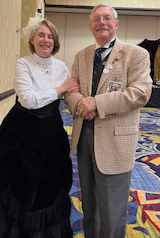
I am a big fan of your The Life and Times of Sherlock Holmes series of essay collections. What was the impetus for writing these books?
When I started my Early Case Files of Sherlock Holmes series, I had to do a lot of research to get the historical period right. One of the first things, for example was that he said his ancestors were country squires. I had to find out what a country squire was and how this might have shaped Sherlock Holmes. As I compiled all this knowledge, I thought it a pity to keep it all to myself and decided to write short essays on various subjects to share with Sherlockian scions for their newsletters. One that I contacted was the Dallas scion (The Crew of the Barque Lone Star), and its leader Steve Mason invited me to a meeting. It might not be apparent, but almost everything in my novels provided the basis for one of my essays.
How do you decide the topics for your quarterly articles in Sherlock's Spotlight Gazette?
I basically go through the essays that I have already written and look for topics that I think are appropriate and of interest to young people. For example, what was school like? Or secret writing as in “The Adventure of the Dancing Men.” After I select the essay, I shorten it because there is a length requirement, then I pass it to you for a readability review. I like the idea that these essays have more than one life, and maybe the young people who read them find them fun and interesting as much as the adults.
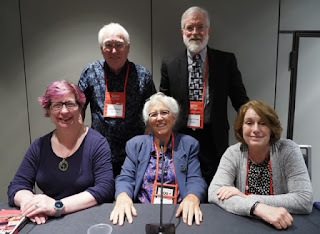
What book would you recommend to other Sherlockians?
Can I mention my own? Just kidding [not].
There are so many good Sherlockian books and series out now. Of course, there’s the Mary Russell series by Laurie R. King. The first is now celebrating its thirtieth birthday (Can you believe it?). I also enjoy Bonnie MacBird’s series which is more Canonical with Holmes and Watson solving cases. One that took a different perspective is Robert Ryan’s Dr. John Watson series. In these books, Watson is serving in WWII and solving mysteries without his companion. He often will consider what Holmes would have said/done in a particular situation as he tries to solve the mystery confronting him.
I really can’t pick one but would suggest to others they check them all out. The nice thing is, there is something out there for every reader’s taste.
Where do you see Sherlockiana in 5 or 10 years from now?
During the pandemic, the Dallas scion went virtual. Before, we would meet once a month at a restaurant with about 20 attending. Once we could meet in person again, the scion continued to meet virtually because it had increased in number and reach. There are regular attendees from many parts of the world. We also have had several young people attend. Two incredible girls from Canada recently did a presentation that blew everyone away. I think the use of virtual meetings with its wider reach can be a great tool to keep Sherlock’s memory and influence alive and further expanding his audience.
May 26, 2024
Interesting Interview: Rudy Altergott
One of the newest member of the Baker Street Irregulars is this week's Interesting Interview, Rudy Altergott! If you've been active in Sherlockiana over the past few years, this name or face my be familiar to you because Rudy is a force of nature! His energy and zeal about Sherlockiana is contagious. To talk with him is to be immediately swept up in a deep conversation. And who know where that conversation will go? It could get you digging into the minutiae of your favorite story or brainstorming ideas for local scion events!
Rudy is also one of the most gracious guys out there. As someone who's relatively new to this hobby of ours, he is quick to give credit to those who have come before him and always eager to learn from other Sherlockians. It's no wonder that he was invested into the BSI this January; Rudy seems to be a lifer at every interest he takes up!

How do you define the word “Sherlockian”?
I have read so many of these interviews and appreciated that among the answers, there is not one single definition. To me, the flexible definition of a Sherlockian would include being someone who loves Sherlock Holmes and detective fiction, who has either read the Sacred Writings in full or in part or has a familiarity with them and wants to learn more, who writes or produces content related to Sherlock Holmes and Dr. Watson and Arthur Conan Doyle, et al., and who attends in-person or virtual scion meetings. Again, I do not think you have to be a Canonical expert. Honestly, I have not read it in its entirety, but have read most of it (I am keeping the shilling, thank you very much!). And someone can be a Sherlockian without attending scion meetings, like my friend Greg Redding, dean of students at our alma mater, Wabash College. Perhaps the definition could simply be someone who loves Sherlock Holmes and detective fiction.
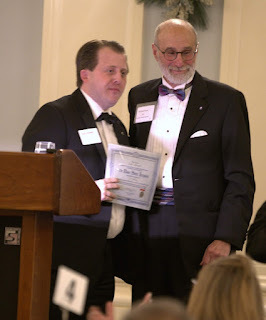
How did you become a Sherlockian?
I was introduced to Sherlockiana proper like Holmes and Watson, by a certain ‘Young Stamford.' I met Terry McCammon, not long before he was to receive that investiture, through my Masonic lodge where he was a regular visitor and is a honorary member. He mentioned Hugo’s Companions when I was visiting his home and woodshop one Saturday in October 2017, and the next dinner was in December. I was invited to attend, did so, and have kept coming since.
What is your profession and does that affect how you enjoy being a Sherlockian?
My current work is as a surgical records manager. Truthfully, it does not really affect me as a Sherlockian. What it has done is brought me even closer to my father and namesake, Dr. Rudy Altergott, Sr., of whom I am most proud, and from whom, like my mother, Dr. Karen Heidkamp, I inherited a love of reading.
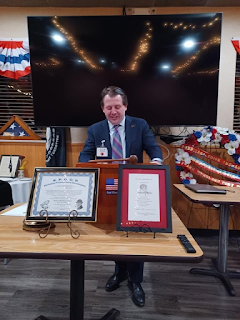
What is your favorite canonical story?
This is a tough question to answer. I may have to say BRUC since I have always loved spy stories, and would include NAVA and SECO along this line. Once when he was in Chicago, over cocktails in Sinatra’s booth at the Pump Room, Dan Andriacco told me that he thought BRUC could arguably be the best story under certain criteria. HOUN is the theme of Chicagoland scions and has some of my favorite lines of Conan Doyle, also showcasing his masterful ways of revealing the truth behind the seemingly supernatural in the Canon. I also feel I must plug VALL and LAST because of my research on Birdy Edwards, Sherlock Holmes (‘Mr. Altamont of Chicago’), and the infiltration of secret societies in the Canon. The denouement of LAST may be my favorite scene in the Canon, but then there is Holmes’ reveal in EMPT. I could keep going on but won’t, for your sake, Rob, and the readers’.
Who is a specific Sherlockian that you think others would find interesting?
I want to highlight George Sheetz of Batavia, Illinois, a Sherlockian of 40-plus years now. Kind and soft-spoken, a retired librarian, he is also one of the most hilarious folk I know. I consider him among my mentors even though he is one of those who treats you like an equal. Every time I am with him, and in the immediate aftermath, I am on cloud nine.

What subset of Sherlockiana really interests you?
I suppose I would say Sherlockian cinephiles or Sherlockians who write on military history. Both of these topics in general are among my lifelong interests. I really regret not introducing myself to Sherlockian film expert Russell Merritt, the last Sherlockian face I saw before departing the ASH Brunch for LaGuardia during the 2023 BSI Weekend.
Chicago is a city with many different scion societies. What is the Sherlockian scene like with so many different groups up there?
There are many different avenues that are their own. The thing I would like to see are more young folk like myself. At the same time, I try to listen and learn from those who have long been involved, and there is much to be gleaned.
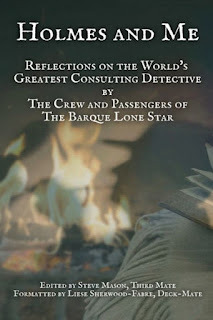
Your chapter in the book Holmes and Me is titled "How Sherlockiana Has Helped Me Through Covid-19." How was Sherlockiana a life raft for you during that time?
It not only made me take the Canon seriously and read more of it for the first time, not only made me read more books in general and become a serious book collector because of Starrett and Morley and authors and books and series that other Sherlockians recommended, it also introduced me to dear, dear friends and made me more comfortable to put myself out there, to introduce myself to the ‘big wigs’ via Zoom. In the final analysis, Sherlockiana during lockdown gave my life new purpose and direction and helped me commit to a life in letters.
What book would you recommend to other Sherlockians?
I would recommend anything by David Baldacci. I am convinced he is a Sherlockian in all but affiliation. A portrait of Conan Doyle is featured in his Master Class course, and he has said that reading The Adventures, specifically SPEC, was an eye-opening experience for him as a kid. He also incorporates Sherlockian tropes in his stories, like disguises, one of my favorite features of the Canon. A good starting point would be his novel Memory Man (2015). The title character, Amos Decker, is a bit like Holmes. A former pro football player, his IQ is heightened to genius level after a brain injury during play. He becomes a police officer and later a private investigator driven to solve the murder of his family. Baldacci’s books are hard to put down.
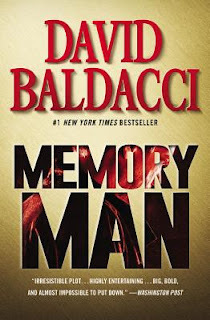
Where do you see Sherlockiana in 5 or 10 years from now?
Frankly, I am optimistic. Wiggins seems receptive to approving new scions, depending on their purpose and such, and some defunct scions have even been resurrected. Who knows? I would not be surprised if, within the next decade, there will be new, stimulating conferences in places in the U.S. and abroad that one might not have imagined. What excites me most is the likelihood of making new friends in that nearer term. This not only expands the Rolodex, it offers more opportunity to learn. (‘Education never ends, Watson…’)



